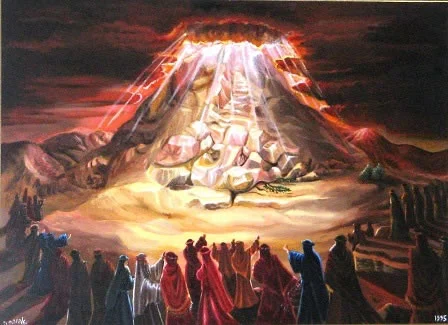It was a cold, rainy winter evening on Manhattan's Lower East Side. Just as the baker was about to close his shop, a man rushes in and orders two bagels.
"One for me, and one for Bernetta," he says.
"Bernetta is your wife?", asks the baker.
"Yes of course", the man replied, "you think my mother would send me out on such a night for a bagel?"
I love Lego, don't you?
As a child, I very much enjoyed playing with lego.
Until today, I love to watch my sons enjoying to build and create. I often find myself joining them on the floor as we build something together.
Mendel is especially fascinated with building tall towers which he calls microphones and then he sings and dances around them.
All is calm and happy until the tower falls and breaks. The sadness, the tears, and the pleas for help to rebuild are overwhelming.
On our Father's shoulders
How to react at the lemons life throws?
Something that I try to keep in mind is actually a verse from this week's Torah portion, where Moses describes how G-d looked after the Jews in the desert, at a time of seemingly endless journey and many uncertainties.
"...G-d has carried you as a man carries his son...".
What does it mean that G-d 'carried' the Jewish people in the desert?
Why Pray? Doesn't G-d know wht hes doing?
One of the questions that really resonated with me was.
Why do we pray? Doesn't G‑d know what He is doing? Can we really affect His will?
I mean, if a central part of Jewish belief is that G-d is all knowing and all powerful, and that all He does is for the best. Isn't it then heretical to ask Him to give us something He hasn't, or change something from one outcome to the other? Why not just leave it in His capable hands?
Looking Higher
Leap of Faith
Our ancestors didn’t run away from Egypt, they ran away from themselves.
The Torah emphasises multiple times how the Jewish People rushed out of Egypt. In fact, to this very day we eat Matzah on Pesach to commemorate how they didn’t have enough time to let their dough rise before leaving.
Wouldn’t the Egyptians have been sufficiently fed up with the Jews and the plagues to happily let the Jews go? Why does it sound like they went out like prisoners in the night, grabbing whatever they could find, not even having enough time to pack a proper sandwich for lunch?
Bridging two worlds
What would you say is the most important Mitzvah? Would you say it’s Shabbat, or perhaps the Holidays? Honouring your parents or being kind to all people?
What interesting to note, is that while these are very important, they are summed up in the Torah in a mere line or two each, with many of their intricate laws not even written clearly in the Torah, rather passed down through oral tradition.
On the other hand, we find that in this week’s Torah portion we are told at great length all the details and miracles involved when Avraham’s servant Eliezer went to find a match for his son Yitzchak.
An everlasting Legacy
What’s worse?
Is it worse to mess up on my relationship with G-d, or with my fellow?
This week's Torah portion and its two stories of the early ancestors of mankind shed light on what G-d considers to be more important. Each story is about the misdeeds of the generation and the punishment G-d imposed on the people accordingly.
The Understanding Judge
As we approach Rosh Hashana, the great Day of Judgment on the Jewish calendar, many may feel at total loss on what this means for them. Slightly cynical of the whole judgment idea, perhaps. “What will I be judged for, considering that my Jewish practice pales comparison to that of my ancestors?”
In the end, some of us just show up in Shul without any real introspection. After all, we hesitate to imagine the outcome of G-d’s judgment for us.
Programmed for sin?
This coming week in the United States millions of people will witness a full solar eclipse. In many traditions a solar eclipse is considered a bad omen for the world. To this day in some parts of the world people do not eat food cooked during an eclipse for fear that evil spirits attach themselves to the food during an eclipse. In other places, women and children are encouraged to stay indoors so as not to be affected by the feared ill effects of an eclipse.
Judaism without an echo
Today when we read in the Torah the story of the revelation at Mt. Sinai, we too are meant to envision that great defining moment in our history. We stand in reverence while it is read, and later we go back to our lives striving to live as if we too had witnessed that sublime event.
Amongst the wondrous descriptions of the giving of the Torah, are details about how G-d’s voice was heard: it was a ‘great loud voice’, and it had ‘no end’.
What does ‘no end’ mean?
Hidden Love
The Talmud tells us that when he Roman conquerers entered the Holy Temple they saw that the two cherubs that were on top of the Ark were facing each other.
What's unusual about this is that we are told that these cherubs had a miraculous ability to mirror the relationship between G-d and the Jewish people; that their facing each other would reflect on G-d being happy with us whereas if unfortunately the relationship was strained, the cherubs would turn their backs to one another.
Yet here, during the destruction of the Holy Temple, at a time when G-d was seemingly not at all pleased with the Jews, these cherubs were surprisingly facing each other. Why was this so?
Climbing the ladder of life
What is the proper outlook to have as we come across struggles in our day to day life?
After we mess up, how can we still attain a balance of being realistic and knowing where we are holding, without causing the idea of change to seem so far off and unfathomable?
The secret to achieving this balance can be found in the Torah:
Crouched like a lion
The enemies of the Jewish people turned to the prophet Bilaam for a spiritual solution; perhaps he could curse the Jewish people.
Bilaam agreed, however, although his aim was to curse the Jews, Hashem arranged for blessings to come from his mouth instead.
Each of these blessings is truly an eye opener and helps to understand the strength of the Jewish people and our continuity despite all the hardships we’ve endured throughout thousands of years.












